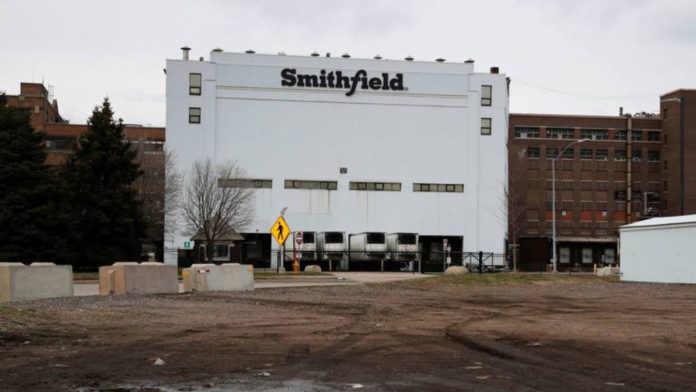Rural America was believed to be safe: far from urban crowds and international airports. Surrounded by plains, fields of wheat and barley, rivers, mountains and large lakes. But the coronavirus has proven to be a cunning traveller and has sneaked into the heartland, causing terrifying powder kegs. The worst of them, unparalleled nationally, at a meat plant in Sioux Falls, South Dakota.
For several days, workers at this factory responsible for processing 5% of the pork produced in the United States broke carcasses and boned hams in cold rooms, unaware of the size of the outbreak that was coming. The first infected was detected on March 24. The next day, the daughter of two factory employees contacted the local newspaper, ‘The Argus Leader’.
“Could you please have a look at Smithfield?”, said the message, referring to the company that owns the meat plant. “They have a positive case [of COVID-19 ] and plan to remain open”; 24 hours later, the newspaper published the scoop.
The cases increased in the following days, but the company only informed the operators that they had been in direct contact with the patients. The rest were urged by text message to keep showing up for work and even given incentives: a $ 500 pay raise. A not inconsiderable amount in one of the poorest counties in South Dakota.
A Babel company
On April 1, management also offered to pay for the employees’ lunches, adding to the cafeteria’s hustle. About 200 workers were there at any time of the day, according to the testimony of one of them. Five days later, given the increase in infections, the company began taking the temperature of employees and closed one of the eight plants to clean it. But they continued to selectively and separately report the most exposed employees.
“With how we work on the line, I would say I got sick because of them not taking safety measures,” a 22-year-old Sudanese-born worker, Michael Bul Gayo Gatluak, told BuzzFeed . “The job is so heavy,” he said. “You have to breathe so hard.”
The company’s guidelines, in addition, were incomprehensible to a good part of the 3,700 workers at the plant: people from the most diverse countries, including Mexico, Honduras, Ethiopia, Nepal, Sudan or the Democratic Republic of the Congo. Working-class migrants who in many cases did not speak English and did not understand the circulars stuck on the walls.
“The circumstances in which certain cultures live are different from those in which a traditional American family lives,” a company spokesperson told BuzzFeed. Smithfield argued that the bulk of the infections occurred outside the factory, in the neighborhoods where the workers lived. At the Sioux Falls plant, according to data from the company itself, at least forty languages are spoken.
The cases continued to grow. When they reached 238, the plant was closed for two days for general cleaning. Then it reopened and continued operating until April 14, when the lock was put under pressure by the state governor, the Republican Kristi Noem. South Dakota is one of the country’s five states, mostly rural, that have refused to enact confinement measures.
America’s biggest focus
At the time of closing, the Sioux Falls plant had 644 confirmed cases of COVID-19 – the highest concentration in the US. Outbreaks of the aircraft carrier USS Theodore Roosevelt and Chicago’s Cook County Jail were small in comparison. The Smithfield patients, in addition, accounted for 55% of the cases detected in South Dakota. The calculation of the plant has already exceeded 800.
The closure of the factory, where the meat of some 20,000 domestic pigs a day was processed, has led to the closure of other plants, both this one and other large food companies. Smithfield has suspended operations at plants in Missouri and Wisconsin; Tyson Foods, which employs 100,000 people nationwide, has also stopped operating at facilities in Iowa and Indiana.
Entrepreneurs in the sector warn that these closings can cause a national supply problem. “The supply chain is breaking,” said Tyson Foods President John Tyson in a newspaper. “There will be a limited supply in the food stores until we can reopen the factories that are currently closed.”
“These plant closings also have severe, perhaps disastrous, repercussions for many in the supply chain – especially for our nation’s ranchers,” Smithfield CEO Kenneth Sullivan added in a statement. If the plants close, the ranchers will have no buyer and will also be affected.
Food is one of the sectors considered essential by the United States Government. The decree suspending the granting of foreign work permits, signed by President Donald Trump last week, does not include those who come to be employed in any of the links of the food chain.
Plant closures have led to fears of rising meat prices. According to Steve Meyers, kerns and associates industry economist, only last week, U.S. meat production fell by 25%. The Department of Agriculture, however, estimates that price increases will be slight: up to 3% for pork.
South Dakota Governor Kristi Noem hopes to reopen the plant “in a matter of days.” “It is a major infrastructure business,” said the Republican on Fox News. “I have always said that our food supply is a matter of national security.”
Other states that did not enact confinement in their day are seeing a dramatic increase in cases. In Mississippi, 62% of infections have occurred in rural counties, rather than cities. In Iowa, where there are 99 counties, virtually all COVID-19 cases have been concentrated in the 22 counties that have barely imposed restrictions.
